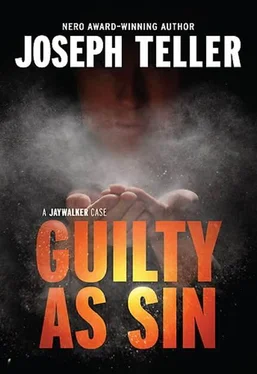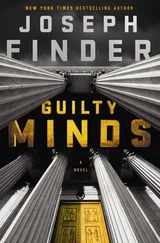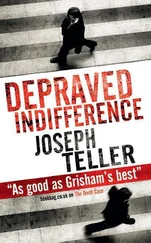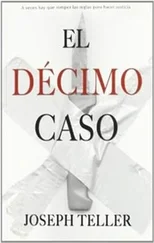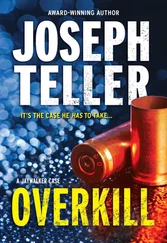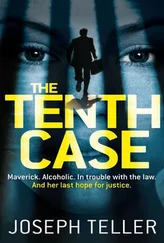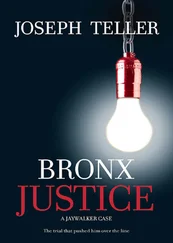Joseph Teller - Guilty As Sin
Здесь есть возможность читать онлайн «Joseph Teller - Guilty As Sin» весь текст электронной книги совершенно бесплатно (целиком полную версию без сокращений). В некоторых случаях можно слушать аудио, скачать через торрент в формате fb2 и присутствует краткое содержание. Жанр: Криминальный детектив, на английском языке. Описание произведения, (предисловие) а так же отзывы посетителей доступны на портале библиотеки ЛибКат.
- Название:Guilty As Sin
- Автор:
- Жанр:
- Год:неизвестен
- ISBN:нет данных
- Рейтинг книги:5 / 5. Голосов: 1
-
Избранное:Добавить в избранное
- Отзывы:
-
Ваша оценка:
- 100
- 1
- 2
- 3
- 4
- 5
Guilty As Sin: краткое содержание, описание и аннотация
Предлагаем к чтению аннотацию, описание, краткое содержание или предисловие (зависит от того, что написал сам автор книги «Guilty As Sin»). Если вы не нашли необходимую информацию о книге — напишите в комментариях, мы постараемся отыскать её.
Guilty As Sin — читать онлайн бесплатно полную книгу (весь текст) целиком
Ниже представлен текст книги, разбитый по страницам. Система сохранения места последней прочитанной страницы, позволяет с удобством читать онлайн бесплатно книгу «Guilty As Sin», без необходимости каждый раз заново искать на чём Вы остановились. Поставьте закладку, и сможете в любой момент перейти на страницу, на которой закончили чтение.
Интервал:
Закладка:
They called it Crime School.
The juvenile justice system has jurisdiction over its subjects until they reach their twenty-first birthdays. Most are released much sooner, so they can be supervised while on the equivalent of parole. At the time of Alonzo Barnett’s stay at Spofford, probation officers typically carried caseloads upward of two hundred juveniles apiece. Which allowed an officer to spend four minutes with each of his charges, oh, every six weeks or so. When it came to Alonzo Barnett, they didn’t even bother. Seeing that he’d already flunked probation once, they weren’t about to give him another chance. Instead, he was released outright two years later, having been outfitted with a shirt, a pair of pants, a pair of ill-fitting shoes and a subway token, all courtesy of the Fortune Society, and a ten-dollar bill, thanks to the largesse of the taxpayers of New York State.
He was seventeen at the time.
As interested as he was in Barnett’s account of the years that followed, Jaywalker figured that could wait for another day. With eight dollars in commissary funds and no bail set, Barnett certainly wasn’t going any where. Besides which, Jaywalker knew the odds. No doubt there were some uneducated, unemployed, unskilled, seventeen-year-old African-Americans with no families who came out of lockup, defied the odds and went on to succeed. But a look at Barnett’s rap sheet had already told Jaywalker more than he needed to know. In addition to Green Haven, he’d seen the sights at Sing Sing, Great Meadow, Fishkill, Dannemora, Auburn and Attica. As for the little time he’d spent out on the street between visits, it didn’t require all that much imagination to fill in the blanks.
What Jaywalker was more interested in right now was the case at hand, the one that looked like it might turn out to be Alonzo Barnett’s final encounter with the court system. Not that it didn’t promise to at last provide Barnett with something he hadn’t had since his fourteenth birthday.
A permanent address.
As seamlessly as he could, Jaywalker gently steered the conversation toward the current charges. Unsure if, GED or no GED, Barnett could read-Jaywalker had made that mistake once with a client, and like most mistakes he made, he would never repeat it-he read the complaint aloud and then summarized the ten counts of the indictment.
“Funny,” said Barnett. “You’re my fourth lawyer on this case. But you’re the first one who’s bothered to read me the charges. Thank you.”
Jaywalker nodded but resisted commenting. He didn’t make criticizing other lawyers a habit, not unless he recognized their names and knew they were $750-an-hour blowhards. None of the ones listed on the previous notices of appearance came close to fitting into that category. So he simply said, “What can you tell me about them?”
“The lawyers?”
“No, the charges.”
He half expected Barnett to deny them, to say he was being framed, that he was the wrong guy, that he had an alibi, that he hadn’t known it was heroin. Once a client of Jaywalker’s had explained that he had diplomatic immunity. The guy was an American citizen, born and raised in Bayonne, New Jersey, who worked as a pipe fitter and had never once been out of the country. But he’d taken a few correspondence courses from an outfit he’d seen advertised on a matchbook, after which they’d mailed him a piece of paper with the word Diploma printed across the top of it. So having received the diploma, he’d figured immunity came along with it.
Kind of like fries, he’d explained.
Alonzo Barnett wasn’t asserting diplomatic immunity. Nor was he claiming frame, ignorance, alibi or mistaken identity. Without missing a beat, he looked Jaywalker squarely in the eye and said, “The charges are true. Every word of them.”
3
“So there you have it in a nutshell,” Jaywalker would tell his listener. “Here was a five-time loser, a man who’d spent the better part of his life in state prison, charged this time with selling a pretty hefty amount of heroin, freely and unequivocally admitting that he’d done exactly that.”
To make matters worse, what Barnett had been accused of went far beyond the single sale and possession spelled out in the Criminal Court complaint. If you were to read the indictment-as Jaywalker had read it first to himself and then aloud to Alonzo Barnett-you soon realized that the case involved more than the October 5 sale and possession. In addition to those crimes, the grand jury had signed off on two earlier heroin sales made to the same “law enforcement official,” although both of those had been for amounts smaller than the two ounces required to turn them into A-1 felonies.
Jaywalker hated drug cases back then and does to this day. Which isn’t the same as saying he hates the defendants themselves. Not by any means. In fact, he’s always found it far easier to empathize with a drug defendant than he has with the vast majority of the muggers, burglars, drunk drivers and con men who come his way. Those sorts deliberately prey on their victims, or by their conduct place others in grave danger. The drug defendant’s biggest victim turns out to be himself. Sure, the politicians will tell you otherwise. They’ll tell you that drug dealers disseminate poison and destroy not only their own lives but those of their customers and their customers’ families, and that they end up costing society billions of dollars annually in health care and social services. To Jaywalker, those words pretty much describe what the tobacco and liquor companies do, year in and year out. The only difference, so far as he can tell, is that they happen to have lobbyists. And whatever you do, don’t get him started talking about the gun manufacturers.
Jaywalker’s years as a DEA agent, especially on those occasions when he was working undercover, had brought him face-to-face with enough small-time, midlevel and even major dealers to know that they were pretty much like other people, just trying to get by. If one dealer got caught-whether by Jaywalker, or some other agent or cop-there was always another one waiting in line right behind him to take his place. No, it wasn’t the dealers who were the problem, either individually or as a group. It was the system itself that perpetuated the charade. By pouring so much money into interdiction, enforcement and imprisonment, and so little into education, treatment and rehabilitation, all the lawmakers ever succeeded in doing was driving up the price of the product until it was literally worth more than gold itself. That in turn insured that people would risk everything-their health, their freedom and their very lives-to grow it, import it, distribute it and even look the other way when it was worth their while to. So no, he didn’t hate the dealers. Most of them were beaten-down users themselves, and almost all of the ones he encountered were getting worse than they deserved. If not this time, then surely the next.
What he hated were the cases.
He hated them because they made him sad. Sad in their testimony to human frailty and human suffering. Sad in their needless futility and ultimate folly. Sad in their dreary same-old, same-old familiarity. There were the direct sale, the observation sale, the buy-and-bust, and the cash-and-stash uncovered in some roach-infested tenement apartment during the execution of a search warrant. It was almost like ordering from one of those old Chinese take-out menus. Choose one from Column A, one from Column B, one from Column C. But it made no difference. You could forget about the names of the different generals and whether you wanted white rice or brown rice. Whatever you ordered was going to taste pretty much like everything else, and would come with the same stale fortune cookie. And whether they got you for possession or sale, direct or observation, you were going to end up with a one-way ticket to state prison.
Читать дальшеИнтервал:
Закладка:
Похожие книги на «Guilty As Sin»
Представляем Вашему вниманию похожие книги на «Guilty As Sin» списком для выбора. Мы отобрали схожую по названию и смыслу литературу в надежде предоставить читателям больше вариантов отыскать новые, интересные, ещё непрочитанные произведения.
Обсуждение, отзывы о книге «Guilty As Sin» и просто собственные мнения читателей. Оставьте ваши комментарии, напишите, что Вы думаете о произведении, его смысле или главных героях. Укажите что конкретно понравилось, а что нет, и почему Вы так считаете.
